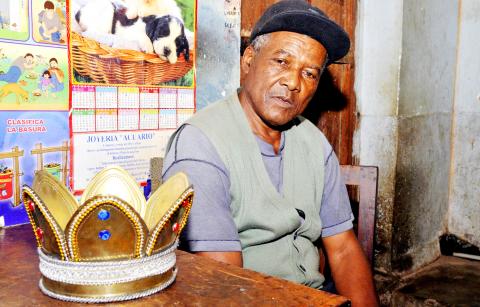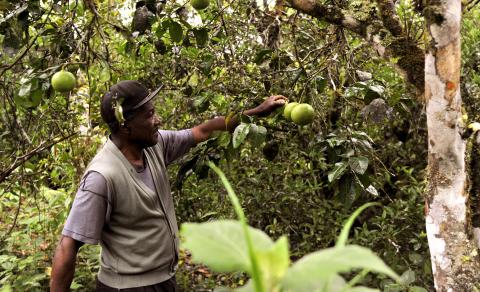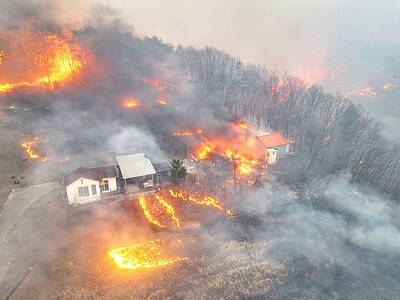He does not have Queen Elizabeth II’s throne or Kate and Wills’ paparazzi, but Bolivian peasant Julio Pinedo is New World royalty: a king who inherited his title from his African ancestors.
Pinedo’s calloused hands, the mark of a lifetime of farming, belie the royal blood passed down to him by the Congolese prince Uchicho, who was taken to the Americas as a slave sometime around 1820.
In the nearly two centuries since then, Afro-Bolivians have lost their languages, religions and much of their history, but Pinedo’s family has managed to hold onto its royal heritage.

Photo: AFP
Today he is recognized as a king by Bolivia’s black community, about 26,000 people descended from the slaves imported under Spanish colonial rule from the 16th to the 19th centuries.
Pinedo, 73, lives in the small village of Mururata, about a two-hour drive north of the capital, La Paz, where he still goes out to the fields every day to farm citrus fruits, coca and coffee.
“When the Spanish invaded they brought my ancestors here. They brought them to the area to work the land,” he said.

Photo: AFP
Orphaned as a young boy when his parents died in an accident, Pinedo was raised by his grandfather Bonifacio, who was crowned king in 1932.
He succeeded his grandfather in 1992, but his official coronation ceremony was only held in 2007.
Pinedo does not have a throne or a court, but he does have a red cape with gold embroidery and a metallic crown, which he wears for local festivals. His title is mainly symbolic, he said.
His sole heir, Prince Roland, works as an office clerk at the Bolivian Congress, while his wife, Queen Angelica Larrea, runs a small shop whose shelves offer a scattering of sodas, sardine tins, cooking oil and bread.
According to the story passed down in the family, prince Uchicho was kidnapped and sold into slavery in the dying days of the Spanish empire. Shipped to Bolivia, he was forced to work on the coca plantations in Los Yungas, the agricultural region where Pinedo still lives.
Today, Pinedo’s image is “a strong source of cultural identity and belonging” for Afro-Bolivians, said Jorge Medina, Boliva’s first black congressman.
Historians do not know exactly how many slaves made the so-called Middle Passage from Africa to the Americas, but the number is in the tens of millions. Up to half died along the way of starvation, disease and brutal treatment.
In Bolivia, which was then the colonial territory of Upper Peru, the slaves were forced to work the silver mines in the city of Potosi and the plantations of Los Yungas.
“We believe that about half a million slaves arrived in Upper Peru, but there are no exact figures. First they brought us to Potosi, then here to Los Yungas,” said Pedro Andaveres, a researcher who specializes in Afro-Bolivian culture.
Most traces of those ancestors have been lost, Andaveres said, adding: “They erased our history, they erased our original dialects, they erased our religions.”
However, Bolivian culture today bears a distinct African imprint that can be heard in its Andean music and seen in the saya and caporales dances set to the rhythms of African drums. And Afro-Bolivians still have their king.
“He’s our symbolic king. We don’t pay tribute to him like a Spanish king, but people respect him,” Medina said.

DEATH CONSTANTLY LOOMING: Decades of detention took a major toll on Iwao Hakamada’s mental health, his lawyers describing him as ‘living in a world of fantasy’ A Japanese man wrongly convicted of murder who was the world’s longest-serving death row inmate has been awarded US$1.44 million in compensation, an official said yesterday. The payout represents ¥12,500 (US$83) for each day of the more than four decades that Iwao Hakamada spent in detention, most of it on death row when each day could have been his last. It is a record for compensation of this kind, Japanese media said. The former boxer, now 89, was exonerated last year of a 1966 quadruple murder after a tireless campaign by his sister and others. The case sparked scrutiny of the justice system in

A French-Algerian man went on trial in France on Monday for burning to death his wife in 2021, a case that shocked the public and sparked heavy criticism of police for failing to take adequate measures to protect her. Mounir Boutaa, now 48, stalked his Algerian-born wife Chahinez Daoud following their separation, and even bought a van he parked outside her house near Bordeaux in southwestern France, which he used to watch her without being detected. On May 4, 2021, he attacked her in the street, shot her in both legs, poured gasoline on her and set her on fire. A neighbor hearing

DITCH TACTICS: Kenyan officers were on their way to rescue Haitian police stuck in a ditch suspected to have been deliberately dug by Haitian gang members A Kenyan policeman deployed in Haiti has gone missing after violent gangs attacked a group of officers on a rescue mission, a UN-backed multinational security mission said in a statement yesterday. The Kenyan officers on Tuesday were on their way to rescue Haitian police stuck in a ditch “suspected to have been deliberately dug by gangs,” the statement said, adding that “specialized teams have been deployed” to search for the missing officer. Local media outlets in Haiti reported that the officer had been killed and videos of a lifeless man clothed in Kenyan uniform were shared on social media. Gang violence has left

‘HUMAN NEGLIGENCE’: The fire is believed to have been caused by someone who was visiting an ancestral grave and accidentally started the blaze, the acting president said Deadly wildfires in South Korea worsened overnight, officials said yesterday, as dry, windy weather hampered efforts to contain one of the nation’s worst-ever fire outbreaks. More than a dozen different blazes broke out over the weekend, with Acting South Korean Interior and Safety Minister Ko Ki-dong reporting thousands of hectares burned and four people killed. “The wildfires have so far affected about 14,694 hectares, with damage continuing to grow,” Ko said. The extent of damage would make the fires collectively the third-largest in South Korea’s history. The largest was an April 2000 blaze that scorched 23,913 hectares across the east coast. More than 3,000